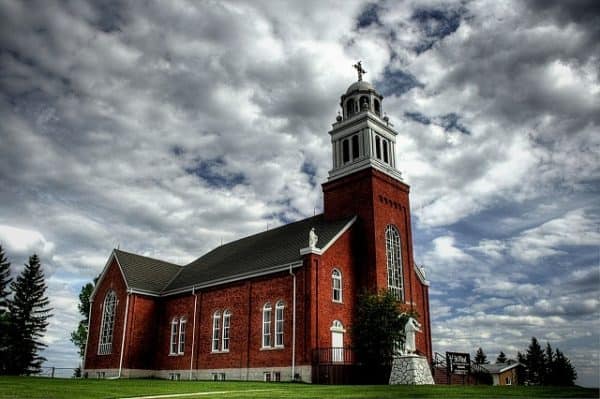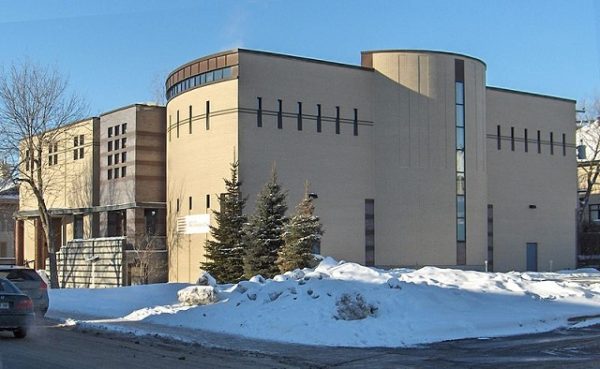Does organized religion have a future in Canada?


How many of us go to church these days? In Canada, the number has been dropping for decades. But a changing religious landscape hasn’t brought about the death of organized worship. Instead, faith groups are adapting in order to survive. But does religion as a whole have a place in an increasingly atheistic society?
These are turbulent times for organized religion the world over, with news headlines dominated by atrocities committed in the name of religious extremism. Canada, too, hasn’t been immune, as exemplified by a rash of hate crimes in recent years, many enacted against those of the Muslim faith.
Canadians view organized religion more negatively than positively
So it comes as no surprise that the very idea of religion has been tarnished as a result. That’s one of the findings from a recent nationwide survey by pollster Angus Reid, which found that more Canadians view the word “religion” negatively than positively, at a rate of 33 per cent to 25 per cent.
“While many of the concepts that various faiths espouse –forgiveness, morality, and mercy– are viewed positively, religion itself evokes more negative associations,” reads the report.
Conducted in partnership with the think tank Cardus and its program called Faith in Canada 150, the survey broke down Canada’s religious spectrum into four groups: Non-Believers (19 per cent of the population), the Spiritually Uncertain (30 per cent), the Privately Faithful (30 per cent) and the Religiously Committed (21 per cent).

That last number, reflecting regular participation in religious services, is par for the course, as religious attendance in Canada has sunk over the past half-century, from 67 per cent of the adult population attending weekly religious services back in the year 1946 to a low of 20 per cent by 2001.
But the drop in attendance hasn’t transpired equally across all faiths, as some groups have been benefitting more than others from an influx of new worshippers from immigrant populations. Muslim, Sikh and Buddhist organizations have seen their numbers grow but also Catholic parishes across the country have seen increases in church-goers from newly arrived residents. About one in five immigrants, for example, are of the Catholic faith, many coming from the Philippines and South America.
Not so much for Protestant groups, however, who with the exception of Evangelicalism are continuing on a downward slope as the average age of their worshippers climbs higher.
In Canada, organized religion is shrinking…
“We are much smaller than we used to be,” says Rev. Dr. John Young, senior theologian with the United Church of Canada, in conversation with Cantech Letter. “The United Church in terms of size, its peak was in the 1960s.”
Dr. Young points to the decline in membership as having spurred a change in focus for the UCC, in line with the evolving nature of religion and spirituality in Canada.
“Now that society has become more secular, we need to give much greater attention to the task of teaching people about the Christian tradition,” says Dr. Young, “and to being a resource to our members who in their day-to-day lives think, ‘Well, how does my faith relate to this decision I make at work or that decision about how I should spend my money or use my leisure time?’” “That’s still very much a work-in-progress for us,” he says.

But a decline in church-goers hasn’t exactly translated into a lack of religiosity or spirituality. Rather, it’s the wider range of religious expression that marks Canada today. Geoffrey Cameron, Principal Researcher for the Bahá’í Community of Canada, spoke to Cantech Letter and said that Canada can now best be described as “post-secular,” meaning that while we’re no longer religious in the traditional sense of being predominantly church-going, we still invoke spirituality and religious observance in our daily lives.
“Religious and spiritual issues have not gone away,” says Cameron. “Canadian society is in a transition towards a much greater degree of religious and spiritual diversity, and this presents new challenges to how we think about the role of religion in society.”
“We need to find new ways of talking with and understanding each other, when it comes to our conversations about the betterment of our society,” he says.
That view of religion as changing but still present should be the prime takeaway from the Angus Reid/Cardus poll, says Ray Pennings, co-founder and executive vice-president at Cardus, who points out that eight in ten Canadians surveyed said that they still have some connection with religious faith today.
“Religion has a bit of an image problem in Canada,” says Pennings, to Cantech Letter. “About half of Canadians polled say they’re uncomfortable around those who are religiously devout,” he says. “Throw in terms like born-again, theology and evangelism, and just 15 per cent of respondents associate those words with a positive meaning.”
“But a majority of respondents (52 per cent) told the pollster that personal faith or religious beliefs were an important factor in how they thought about public issues and problems facing society,” says Pennings. “Many may be surprised at that, given the Canadian propensity to privatize religion and leave it out of polite conversation.”
So, what will religion in Canada look like in another 50 years? Even fewer folks in church pews, it seems, with the millennial generation tracking as even less prone to be religiously affiliated than either the Gen Xers or Baby Boomers before them. “The poll shows that millennials (aged 18 to 34) are the least likely to have grown up with regular religious observance,” says Pennings. “So, there is the hint of a possible trend toward less religiosity and familiarity with spiritual ideas and concepts.”

